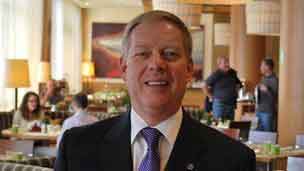
It is midday in Poznan, and a large gaggle of tourists has gathered beneath the clock of the 16th Century town hall, to witness a bizarre daily ritual that has been going on for centuries.
As the clock strikes 12, two metal goats emerge from a small window high up on the wall and begin to lock horns.
In the market square below Chris Pedersen is on hand to explain to a group of rather bemused tourists exactly what is going on.
Apparently it is all to do with cooking, and a feast that took place long ago.
Chris is a former restaurant owner from Berlin who has been living in Poznan for the past four years.
He now makes his living providing culinary tours of the city. He shows people the sights, then cooks them dinner.
Chris is one of a growing number of Germans who have decided to live and work in Poland.
Some are employed by the many large German corporations, such as Volkswagen, which have a major presence in the city.
Many others though have come here to start businesses – and see Germany’s eastern neighbour as a land of opportunity.
„The market in Germany is so crowded,” says Chris.
„Everything exists already, so if you have a good business idea you’ll find many other people are doing exactly the same. There’s so much competition.
„In Poland it’s different. People are still curious and if you have a new idea there’s plenty of room to develop it.”
’It’s so modern’
Poznan is only the fifth largest city in Poland, but because it is relatively close to the German frontier – a mere three hours from Berlin along an arrow-straight motorway – it has become a favourite destination for a new wave of German entrepreneurs.
A short tram ride from the town centre, a number of plush new hotels have been built to cater for the foreign influx.

Germany and Poland have a strong business relationship, says Marco
The manager of the Sheraton, Marco Foelske, is himself German. He says at least a third of his guests are business travellers from his homeland.
But he believes that for many of them a trip to Poland remains a journey into the unknown.
„I think quite often Poland is still perceived as – behind the Iron Curtain, out in the East, the unexpected.
„Then people come here and they’re really surprised. They say, 'Oh it’s so modern’.
„About 60% of Germans have never been to Poland. So there is still this resistance from people who haven’t seen the unknown yet!”
The German business community in Poznan is relatively close-knit and regular meetings are hosted by the German-Polish Business Circle – a kind of club for executives and entrepreneurs in the city.
Angelika Menze, who organises its events, says that Poland is a natural home for German investment.
„You find conditions which are just the same as at home, and you can also count on very good workers who will identify with your company,” she says.
„And you can win an enormous market – people are interested in German products. German products have a good name in Poland.”
Ignoring history
You might think that the turbulent relationship the two countries have had in the past would make it difficult for Poles to accept the growing influx of German workers – but in fact that does not appear to be the case.
According to Jan, a sushi chef in his thirties, young people at least are willing to forgive and forget.
„Because of the eurozone crisis, people have started to change their attitudes,” he says
„They’re going to be happy if it helps them find a job.
„So young people, they just cut the history and don’t think about it. It might be a bit different for older people though.”
In fact, concerns about the amount of investment heading eastwards are more likely to be heard in Germany itself, particularly in the former German Democratic Republic.
Much of the region is still struggling to attract new investment, to replace the state-owned industry which collapsed in the wake of German reunification two decades ago.
„Businesses are leaving east Germany and there’s a lot of unemployment there,” says Grzegorz Glowacki, a Polish banker who lives and works in Berlin.
„Meanwhile investors are moving to Poland – and the Polish government is very happy about that.”
While the growing relationship between Germany and Poland is widely seen as the inevitable consequence of the latter joining the European Union, there are other factors at play as well.
Among them, say analysts, is the close relationship between the German Chancellor, Angela Merkel, and the Polish prime minister, Donald Tusk.
According to Marco Foelske, it is something the German community in Poznan would like to see continue after the election.
„As the Americans say, better the devil you know than the devil you don’t.
„It’s a very strong business relationship at the moment and a very comfortable one.
„Certainly the large companies know what they have at the moment, and absolutely they like things the way they are,” he says.
’Clocks tick a bit differently’
Meanwhile, life in Poznan is not without its challenges – the Polish language it seems is tricky to learn and German is not widely spoken, so most Germans try to get by, by speaking English.
Chef and tour guide Chris Pedersen has some advice for his fellow Germans.
„The challenge is to accept the difference between German and Polish mentalities,” he says.
„The clocks tick a bit differently here, you could say. I had to learn that in Poland, everything you want done will be done, but always at the last minute.
„For someone brought up in Germany, that’s very difficult to get used to.”
Source: www.bbc.co.uk
